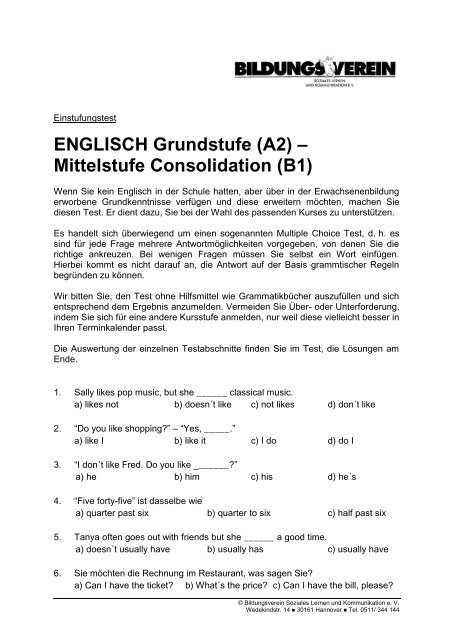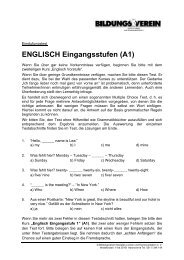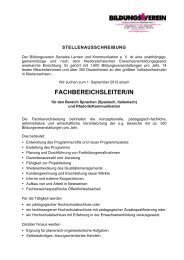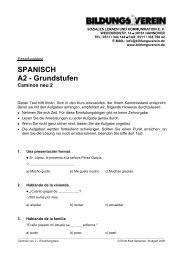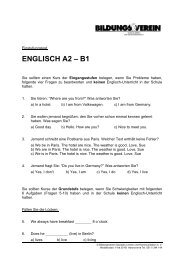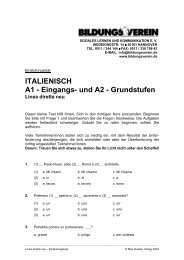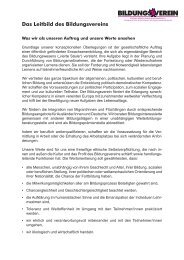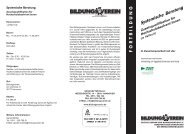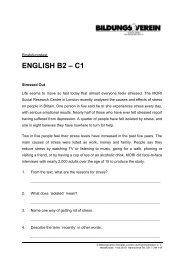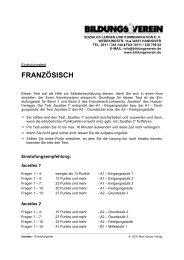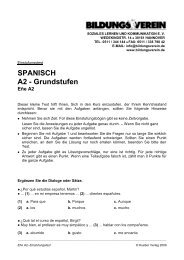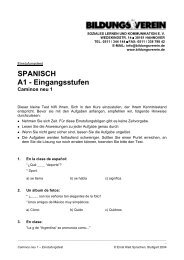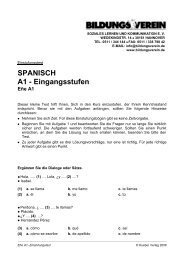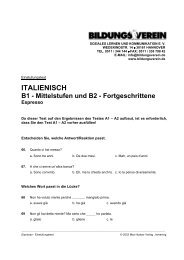ENGLISCH Grundstufe (A2) – Mittelstufe ... - Bildungsverein
ENGLISCH Grundstufe (A2) – Mittelstufe ... - Bildungsverein
ENGLISCH Grundstufe (A2) – Mittelstufe ... - Bildungsverein
Create successful ePaper yourself
Turn your PDF publications into a flip-book with our unique Google optimized e-Paper software.
Einstufungstest<br />
<strong>ENGLISCH</strong> <strong>Grundstufe</strong> (<strong>A2</strong>) <strong>–</strong><br />
<strong>Mittelstufe</strong> Consolidation (B1)<br />
Wenn Sie kein Englisch in der Schule hatten, aber über in der Erwachsenenbildung<br />
erworbene Grundkenntnisse verfügen und diese erweitern möchten, machen Sie<br />
diesen Test. Er dient dazu, Sie bei der Wahl des passenden Kurses zu unterstützen.<br />
Es handelt sich überwiegend um einen sogenannten Multiple Choice Test, d. h. es<br />
sind für jede Frage mehrere Antwortmöglichkeiten vorgegeben, von denen Sie die<br />
richtige ankreuzen. Bei wenigen Fragen müssen Sie selbst ein Wort einfügen.<br />
Hierbei kommt es nicht darauf an, die Antwort auf der Basis grammtischer Regeln<br />
begründen zu können.<br />
Wir bitten Sie, den Test ohne Hilfsmittel wie Grammatikbücher auszufüllen und sich<br />
entsprechend dem Ergebnis anzumelden. Vermeiden Sie Über- oder Unterforderung,<br />
indem Sie sich für eine andere Kursstufe anmelden, nur weil diese vielleicht besser in<br />
Ihren Terminkalender passt.<br />
Die Auswertung der einzelnen Testabschnitte finden Sie im Test, die Lösungen am<br />
Ende.<br />
1. Sally likes pop music, but she ______ classical music.<br />
a) likes not b) doesn´t like c) not likes d) don´t like<br />
2. “Do you like shopping?” <strong>–</strong> “Yes, _____.”<br />
a) like I b) like it c) I do d) do I<br />
3. “I don´t like Fred. Do you like _______?”<br />
a) he b) him c) his d) he´s<br />
4. “Five forty-five” ist dasselbe wie<br />
a) quarter past six b) quarter to six c) half past six<br />
5. Tanya often goes out with friends but she ______ a good time.<br />
a) doesn´t usually have b) usually has c) usually have<br />
6. Sie möchten die Rechnung im Restaurant, was sagen Sie?<br />
a) Can I have the ticket? b) What´s the price? c) Can I have the bill, please?<br />
© <strong>Bildungsverein</strong> Soziales Lernen und Kommunikation e. V.<br />
Wedekindstr. 14 � 30161 Hannover � Tel. 0511/ 344 144
7. When he does the washing up, she ______ long phone calls.<br />
a) does b) make c) makes d) do<br />
8. I never get up before 10 am ______ Sunday.<br />
a) on b) at c) in<br />
9. “I always watch ‘Friends’” bedeutet:<br />
a) Ich verpasse keine Folge von „Friends”. b) Ich sehe meine Freunde oft.<br />
Wenn Sie mehr als drei Fehler in diesem Testabschnitt hatten, machen Sie bitte den<br />
Einstufungstest „Englisch Eingangsstufen (A1)“. Bei drei oder weniger Fehlern<br />
setzen Sie den Test fort.<br />
10. Yesterday I __________ (talk) to my neighbour about the loud music.<br />
11. My friend moved to England ______ year and I visited her two months ______ .<br />
a) last/ ago b) this/ since c) last/ for<br />
12. When ______ the last time you ______ swimming?<br />
a) is/ went b) was/ went c) was/ go<br />
13. “Did you ______ to the pub last night?” <strong>–</strong> “Yes, I ______.”<br />
a) went/ do b) goes/ do c) go/ went d) go/ did<br />
14. My sister ______ yesterday.<br />
a) didn´t work b) doesn´t work c) doesn´t worked d) didn´t worked<br />
15. “I´m ______.” <strong>–</strong> “Me too. Let´s stay at home tonight.”<br />
a) bored b) hungry c) tired d) thirsty<br />
16. “______ a computer in your living room?” <strong>–</strong> “Yes, ______.”<br />
a) Is there/ it´s b) Is there/ there is c) Are there/ there are<br />
17. The room where you cook is your ______.<br />
a) living room b) kitchen c) bathroom d) bedroom<br />
18. My parents live _____ a small town ______ a river.<br />
a) in/ near b) by/ in c) at/ on<br />
Wenn Sie mehr als drei Fehler in diesem Testabschnitt hatten, belegen Sie bitte den<br />
Kurs „Englisch <strong>Grundstufe</strong> 1 (<strong>A2</strong>)“. Bei drei oder weniger Fehlern setzen Sie den<br />
Test fort.<br />
19. Much or many?<br />
I don´t eat __________ meat, but I eat __________ eggs.<br />
© <strong>Bildungsverein</strong> Soziales Lernen und Kommunikation e. V.<br />
Wedekindstr. 14 � 30161 Hannover � Tel. 0511/ 344 144
20. There´s ______ water on the table.<br />
a) any b) some c) not<br />
21. “How much cheese is there?”<br />
a) There aren´t any. b) There isn´t much. c) There are a lot.<br />
22. “What´s Sam doing at the moment?” <strong>–</strong> “He ______ in the garden.”<br />
a) working b) works c) is working d) work<br />
23. He has ______ hair and ______ eyes.<br />
a) dark, curly/ blue b) long, short/ blond c) handsome/ green<br />
24. In a shop: “Can I help you?”<br />
a) “No thanks, I don´t like red.”<br />
b) “No, I´m just looking, thank you.”<br />
c) “Certainly, the changing rooms are here.”<br />
25. I think Folkstone is ______ Brighton.<br />
a) bigger b) quieter then c) quieter than d) more quieter than<br />
26. This hotel is really __________ (bad), but that one over there is even ________<br />
(bad) and the one down the road is the __________ (bad) of them all.<br />
27. Alec has a good job. He earns a good ______.<br />
a) salary b) debt c) bill d) money<br />
Wenn Sie mehr als drei Fehler in diesem Testabschnitt hatten, belegen Sie bitte den<br />
Kurs „Englisch <strong>Grundstufe</strong> 2 (<strong>A2</strong>)“. Bei drei oder weniger Fehlern setzen Sie den<br />
Test fort.<br />
28. Max ______ cook very well, but he ______ speak five languages.<br />
a) can/ doesn´t can b) can´t/ can c) cans/ can´t d) can´t/ can´t<br />
29. When you give a lot of time and/ or money to people you are ______.<br />
a) selfish b) serious c) confident d) generous<br />
30. When she drives, she always does it very _______; she is a ______ driver.<br />
a) carefully/ good b) careful/ good c) carefully/ well d) careful/ well<br />
31. I really like watching ______ on exotic animals.<br />
a) game shows b) documentaries c) soap operas<br />
32. “Are you going to see Elena tonight?”<br />
a) “Yes, I´m going.” b) “Yes, I´m.” c) “Yes, I see.” d) “Yes, I am.”<br />
© <strong>Bildungsverein</strong> Soziales Lernen und Kommunikation e. V.<br />
Wedekindstr. 14 � 30161 Hannover � Tel. 0511/ 344 144
33. Vervollständigen Sie den Satz mit “going to” und dem Verb:<br />
I _______________________________________________ (buy) a house.<br />
Unterstreichen Sie die korrekte Form des Verbs in den nächsten 3 Sätzen:<br />
34. Last week Jenny went/ has been to the beach.<br />
35. Have you ever seen/ Did you ever see U2 in concert?<br />
36. I´ve never been/ I never went to Brazil.<br />
37. “Excuse me, is there a bus stop ______ here?” <strong>–</strong> “Yes, turn left ______ the<br />
corner, it´s ______ the church.”<br />
a) near/ at/ next to b) at/ by/ in c) near/ at/ between d) at/ at/ to<br />
38. What kind of music do you like to listen ______?<br />
a) with b) to c) from d) about<br />
39. What would you like to talk ______ today?<br />
a) with b) to c) from d) about<br />
Wenn Sie mehr als vier Fehler in diesem Testabschnitt hatten, belegen Sie bitte den<br />
Kurs „Englisch <strong>Grundstufe</strong> 3 (<strong>A2</strong>)“. Bei mehr als zwei Fehlern belegen Sie bitte<br />
den Kurs „Englisch <strong>Grundstufe</strong> 4 (<strong>A2</strong>)“. Bei zwei oder weniger Fehlern setzen Sie<br />
den Test fort.<br />
Um mehr Sicherheit zu erlangen können Sie an dieser Stelle auch den Kurs „Englisch<br />
Auffrischung 1. Teil (<strong>A2</strong>)“ mit den Folgekursen „Englisch Auffrischung 2. Teil<br />
(<strong>A2</strong>) und „Festigung <strong>Grundstufe</strong>n (<strong>A2</strong>)“ wählen.<br />
40. My father´s sister is my _______.<br />
a) niece b) nephew c) sister-in-law d) aunt<br />
41. “Is that your new boyfriend? He _______ nice!” <strong>–</strong> “Yes, I think he _______<br />
George Clooney.”<br />
a) looks like/ looks like b) looks like/ looks<br />
c) looks/ looks like d) looks/ looks<br />
42. Question:<br />
a) “Can you play the piano?” b) “Do you can play the piano?”<br />
c) “Play you the piano?”<br />
Answer: “No, I can´t.”<br />
43. Question:<br />
a) “What means ‘rarely’”? b) “What does ‘rarely’ mean?”<br />
c) “What does means ‘rarely’?”<br />
Answer: It’s the same as “seldom”.<br />
44. My town is _______ crowded place.<br />
a) too b) very c) so a d) such a<br />
© <strong>Bildungsverein</strong> Soziales Lernen und Kommunikation e. V.<br />
Wedekindstr. 14 � 30161 Hannover � Tel. 0511/ 344 144
Complete the text with three words from the box.<br />
a) any b) few c) lots d) many e) much f) little g) fewer<br />
I´m studying English in a town in the south of England this summer. But I don´t<br />
really like it here. There´s too (45) ________ traffic and it´s crowded and noisy.<br />
There´s nothing for young people to do. There are (46) ________ of expensive<br />
restaurants, but only a (47) _________ fast-food restaurants.<br />
Change the word in brackets in 48. and 49. if and where necessary.<br />
48. You play the piano really ____________. (good)<br />
49. Bob always arrives too ____________. (late)<br />
50. “Did you _________ to the pub last night?” <strong>–</strong> “Yes, I ________.”<br />
a) go/ did b) go/ went c) went/ went d) went/ did<br />
51. When I ________ into the office, my boss ________ for me.<br />
a) came/ waited b) came/ was waiting<br />
c) was coming/ was waiting d) was coming/ waited<br />
Wenn Sie mehr als vier Fehler in diesem Testabschnitt hatten, belegen Sie bitte den<br />
Kurs „Englisch <strong>Mittelstufe</strong> 1 (B1)“. Bei vier oder weniger Fehlern setzen Sie den<br />
Test fort.<br />
52. I gave my grandmother a ________ of chocolates for her birthday.<br />
a) pint b) can c) box d) piece<br />
53. My father is wearing a _________ silk tie.<br />
a) striped b) cotton c) ugly<br />
54. Kevin is a lawyer. He usually __________ to his office in the morning, but today<br />
he _______ at home.<br />
a) went/ works b) is going/ is working<br />
c) goes/ is working d) goes/ works<br />
55. The children enjoyed _________ him.<br />
a) to help b) helping c) to helping d) helped<br />
Write the superlative forms of the adjectives (for example big <strong>–</strong> biggest).<br />
56. Jack is the ___________________ (funny) guy I know.<br />
57. This is the ___________________ (exciting) film I´ve ever seen.<br />
Complete the sentences with one of the phrasal verbs in the box.<br />
a) clear it up b) switch it off c) switch it on d) throw it away<br />
58. You can´t use your mobile phone here. Please ________.<br />
59. There´s a terrible mess in the kitchen. Could you help me ________?<br />
© <strong>Bildungsverein</strong> Soziales Lernen und Kommunikation e. V.<br />
Wedekindstr. 14 � 30161 Hannover � Tel. 0511/ 344 144
60. I work at home so I ________ wear what I like.<br />
a) have to b) must c) can d) shouldn´t<br />
61. “________ a famous film star?” <strong>–</strong> “Yes, I have.”<br />
a) Were you ever meeting b) Did you ever meet<br />
c) Have you ever met<br />
62. ________ you ever been to Italy? How ________ you like it?<br />
a) Have/ did b) Have/ have c) Did/ did<br />
63. My grandmother ________ 30 years ago.<br />
a) has died b) died c) is dying d) was dying<br />
Wenn Sie mehr als vier Fehler in diesem Testabschnitt hatten, belegen Sie bitte den<br />
Kurs „Englisch <strong>Mittelstufe</strong> 2 (B1)“. Bei vier oder weniger Fehlern setzen Sie den<br />
Test fort.<br />
64. I´m definitely in favour _________ less and walking more.<br />
a) to drive b) driving c) of driving<br />
65. I ________ of buying a new car.<br />
a) ´m thinking b) think<br />
66. Write the question to the answer:<br />
A: “The president spoke to the crowd.”<br />
Q: a) “Who spoke the president to?” b) “Who did the president speak to?”<br />
67. What ________ on Saturday?<br />
a) will you do b) do you do c) do you d) are you doing<br />
68. I don´t ________ a lot in common with my best friend.<br />
a) share b) do c) have d) make<br />
69. Teachers ________ an important role in the lives of young people.<br />
a) play b) are c) make d) do<br />
70. ________ you ________ work late again last night?<br />
a) Had/ to b) Couldn´t/ to c) Did/ have to d) Did/ must<br />
71. I don´t think you ________ take this job. It´s very badly paid.<br />
a) mustn´t b) should c) must d) shouldn´t<br />
72. I get a bit nervous in groups of people. I´m really quite ________.<br />
a) shy b) loyal c) bossy d) ambitious<br />
© <strong>Bildungsverein</strong> Soziales Lernen und Kommunikation e. V.<br />
Wedekindstr. 14 � 30161 Hannover � Tel. 0511/ 344 144
73. Patrick cried when his friend was ill. He´s very ________.<br />
a) sociable b) sensitive c) angry d) enthusiastic<br />
74. I´ve had this watch ________ 10 years, but now I haven´t seen it ________ last<br />
weekend.<br />
a) for/ for b) since/ since c) for/ since d) since/ for<br />
75. I _________ this job since 1982. It´s time for a change.<br />
a) did b) am doing c) have been doing d) have did<br />
Wenn Sie mehr als vier Fehler in diesem Testabschnitt hatten, belegen Sie bitte den<br />
Kurs „Englisch <strong>Mittelstufe</strong> 3 (B1)“. Bei vier oder weniger Fehlern setzen Sie den<br />
Test fort.<br />
76. Slow down! You´re always in a _________.<br />
a) hurry b) fast c) quick<br />
77. I ________ Madonna, but I don´t now.<br />
a) like b) used to like c) used to liked<br />
78. If it rains tomorrow, I ________ the train.<br />
a) will take b) would take c) take d) taking<br />
79. ________ this programme finishes, I´m going to bed.<br />
a) As b) If c) As soon as<br />
80. Don´t let Jane see that spider. She´s terrified ________ them.<br />
a) on b) with c) against d) of<br />
81. My mother is afraid __________ flying.<br />
a) on b) of c) by d) with<br />
82. "I don´t feel very well at the moment."- “You don´t look well. If I _________ you,<br />
I´d go and see a doctor.”<br />
a) had been b) would be c) were d) am<br />
83. That´s the man ________ was driving the car.<br />
a) which b) he c) who<br />
84. “That´s a very strange story.” <strong>–</strong> “It´s more than that. It´s absolutely ________.”<br />
a) incredible b) exhausted c) tired d) interesting<br />
85. When Bertie __________ (got) home, the party ________ (already/ start).<br />
a) had got/ had already started b) got/ had already started<br />
c) got/ already started<br />
© <strong>Bildungsverein</strong> Soziales Lernen und Kommunikation e. V.<br />
Wedekindstr. 14 � 30161 Hannover � Tel. 0511/ 344 144
86. ________ your car ________ (build) in Germany?<br />
a) Is/ build b) was/ builded c) has/ built d) was/ built<br />
87. It ________ snow tonight, but I´m not sure.<br />
a) might b) can´t c) will definitely d) definitely won´t<br />
Wenn Sie mehr als vier Fehler in diesem Testabschnitt hatten, belegen Sie bitte den<br />
Kurs „Englisch <strong>Mittelstufe</strong> 4 (B1)“. Bei vier oder weniger Fehlern belegen Sie einen<br />
der vier Kurse im Bereich „<strong>Mittelstufe</strong> Consolidation“ je nach gewünschtem<br />
Schwerpunkt (siehe Kursbeschreibungen im Programm). In diesen Abendkursen<br />
stehen Wortschatzbildung und Ausbau der kommunikativen Fähigkeiten im<br />
Vordergrund.<br />
Daran anschließend können Sie den „Englisch Conversational Course (B1)“ als<br />
Abendkurs oder Bildungsurlaub besuchen. Zur Wiederholung bestimmter Grammatikschwerpunkte<br />
bietet sich das Wochenendseminar „Englisch Grammatik Intensiv<br />
(B1)“ an.<br />
Lösungen:<br />
1. b<br />
2. c<br />
3. b<br />
4. b<br />
5. a<br />
6. c<br />
7. c<br />
8. a<br />
9. a<br />
10. talked<br />
11. a<br />
12. b<br />
13. d<br />
14. a<br />
15. c<br />
16. b<br />
17. b<br />
18. a<br />
19. much/ many<br />
20. b<br />
21. b<br />
22. c<br />
23. a<br />
24. b<br />
25. c<br />
26. bad/ worse/<br />
worst<br />
27. a<br />
28. b<br />
29. d<br />
30. a<br />
31. b<br />
32. d<br />
33. am going to<br />
buy<br />
34. went<br />
35. Have …<br />
seen<br />
36. I’ve never<br />
been<br />
37. a<br />
38. b<br />
39. d<br />
40. d<br />
41. c<br />
42. a<br />
43. b<br />
44. d<br />
45. much (e)<br />
46. lots (c)<br />
47. few (b)<br />
48. well<br />
49. late<br />
50. a<br />
51. b<br />
52. c<br />
53. a<br />
54. c<br />
55. b<br />
56. funniest<br />
57. most<br />
exciting<br />
58. b<br />
59. a<br />
60. c<br />
61. c<br />
62. a<br />
63. b<br />
64. c<br />
65. a<br />
66. b<br />
67. d<br />
68. c<br />
69. a<br />
70. c<br />
71. b<br />
72. a<br />
73. b<br />
74. c<br />
75. c<br />
76. a<br />
77. b<br />
78. a<br />
79. c<br />
80. d<br />
81. b<br />
82. c<br />
83. c<br />
84. a<br />
85. b<br />
86. d<br />
87. a<br />
© <strong>Bildungsverein</strong> Soziales Lernen und Kommunikation e. V.<br />
Wedekindstr. 14 � 30161 Hannover � Tel. 0511/ 344 144


